 The Maryland Early Learning Standards cover seven domains of development and learning. These domains are also used as the basis for the Kindergarten Readiness Assessment, and they can provide you with a roadmap for the work you do with children each and every day.
The Maryland Early Learning Standards cover seven domains of development and learning. These domains are also used as the basis for the Kindergarten Readiness Assessment, and they can provide you with a roadmap for the work you do with children each and every day.
Social foundations include the skills necessary to:
- Regulate one’s own behavior and emotions
- Develop healthy relationships with adults and other children
- Create a positive personal identity
- Develop executive function skills, including inhibitory control, working memory, cognitive flexibility, curiosity, and persistence
- Participate and engage in learning
Physical well-being and motor development includes skills related to:
- Muscle control, balance, and coordination
- Body awareness
- Wellness, rest, exercise, health, and nutrition
- Self-help skills, such as dressing, brushing teeth, washing hands, and feeding
Language and literacy includes reading, writing, speaking and listening, and language:
- Reading includes the foundational concepts of print, phonemic awareness, phonics, and fluency; and reading and comprehension skills for informational and literary texts.
- Writing includes developmentally appropriate drawing, dictating, and writing to explain, express an opinion, or to tell a story.
- Speaking and listening includes participating in conversations, asking and answering questions, describing information, speaking audibly, with a command of the English language as appropriate.
- Language includes using the conventions of English grammar when writing or speaking, as well as and capitalization, punctuation, and spelling as appropriate when writing. It also includes learning vocabulary words and phrases.
Mathematics includes skills related to:
- Counting and cardinality
- Operations and algebraic thinking
- Numbers and operations in base ten
- Measurement and data
- Geometry
Children learn about numbers, precision and value, and number relationships. They also learn about spatial awareness through geometry and measurement.
Science is about children developing scientific thinking skills while exploring the natural and physical world around them.
They learn how to:
- Ask questions
- Experiment
- Apply evidence
- Reason
- Draw conclusions
- Communicate their findings.
Children use their curiosity to explore, question, and investigate earth and physical, and life science at an appropriate level.
Social Studies gives children an understanding of their sense of self-identity and how people relate to each other in a society.
This includes:
- Social structures (rules and the process of rulemaking)
- Social relationships (family, friends, and community)
- Economic relationships (the transfer of goods and services)
In early childhood, children begin to develop an understanding of the different relationships between people and the roles they play in society.
The Arts focus on the use of music, dance, visual arts, and theater to express ideas and emotions.
The skills in this domain help to foster learning and development in all other areas of Maryland Early Learning Standards and the Maryland College and Career-Ready Standards. The arts give children opportunities to apply skills and knowledge in unique, individual, and creative expressions.
Finally, it’s normal that all children do not develop on exactly the same clock. There are, however, predictable periods of progress and developmental milestones. As someone who works with children, it’s important for you to understand development across all the domains – this helps you support children in their current state of readiness and as they grow.
Brain Science and Early Development
Neuroscience helps us understand how children’s brains typically develop. Infancy is a time of tremendous growth in all areas of development, as described in Healthy Beginnings. Children’s brains are built through their early experiences. In fact, their brains develop more rapidly during the first five years of life than at any other period. The early years of a child’s life represent a great opportunity for you as an educator.

